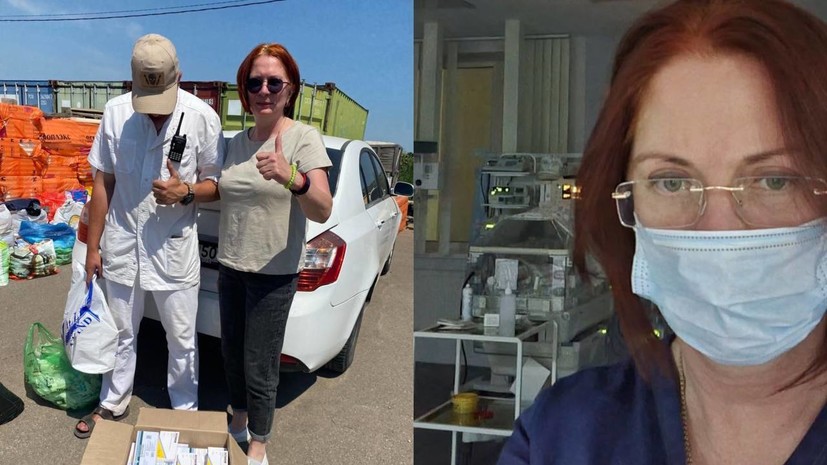— When and how did you start your volunteer activities?
- Many acquaintances began to help the guys at the border back in March last year. At first, I transferred money, bought something. A good friend of mine, Olga, a professor at Belgorod University, told me that she and her neighbors had started collecting humanitarian aid. And I began to collect things with her, cook food and pass it all on through friends. And then we decided that we needed to go to the guys ourselves.
On our first trip, we cooked a huge pot of borscht, cooked 15 kilograms of pilaf. Olga's son took everything to the guys. We exchanged phone numbers.
- © Photos from the personal archive
— Did your medical skills come in handy?
- When we first started helping, there were virtually no schools of tactical medicine. And we decided to train the guys. I had to remember the course of military field therapy, surgery. We came to the soldiers and showed right on ourselves what and how to do with what wounds, and what should not be done in any case. I remember how wrong I was at first, saying "child" instead of "wounded" out of habit. Later, our Belgorod State University provided a room for classes. There we already showed everything on mannequins. Both artificial respiration and injections were taught.
— How do you manage to combine work in intensive care and volunteering?
- At first, my daughter was indignant that I was from work to the front, from the front to work. I remember that in November I worked for a day, then I worked with student trainees, and in the evening volunteers called me: I urgently needed to take the necessary things to the guys 200 km away. I sat down and went, only in the second hour of the night I returned home. And in the morning to work.
- © Photos from the personal archive
But I will be able to sleep and rest, but they cannot wait, they need to defend their homeland now, and not in three days. So I combine work and help. Over time, the family became involved in this activity. But do we really have a choice? This is our country, our guys. Once I told them: "I adopted you until the end of the NWO, then do what you want, and now I am your mother, I am responsible for you!"
On vacation, I asked to go to the hospital to help. For two weeks I went there every day. I scold the guys if they don't take care of their health. I think that after graduation we will not part, we will communicate. This year, these months are a lifetime.
— Why did you decide to devote yourself to neonatology?
- Mom often took me with her to work in the clinic, and I was very imbued with this. When the question arose about admission, I decided to go to Astrakhan, since we did not have a medical one in Belgorod. After the third year, we had a nursing practice, and I accidentally ended up in the maternity hospital, in the department for newborns. And as I got there more than 30 years ago, I never left again. Although I originally planned to be a pediatrician or surgeon.
For the last 15 years I have been working in the intensive care unit of newborns. It's very hard work. But you see the result of your work.
Last year, the smallest patient weighed only 540 g. In addition to the fact that you need to have specific knowledge and experience, you need patience and physical endurance. Do everything to ensure that they not only survive, but also be healthy. You always try to keep in touch with mothers after discharge to see how children grow and develop. Now in the maternity hospital I meet the children of those whom 20-25 years ago I took myself. This, of course, is worth a lot.
- How did you meet the news about the start of the NWO?
"I was on duty that day. After another round of the children, I came to the resident to write diaries. At 05:30 I heard loud noises. Acquaintances began to write, call. Only after a while did my colleagues and I realize what it was.
Yes, life is by no means calm now, but I have never been surrounded by so many people with a capital letter. You find kindred spirits from all over the country - from Moscow, from Ussuriysk. Some of my friends from the capital lost their son, but they did not lose faith: they are also actively helping, passing on many useful things.
Someone transfers money, helps with tools, medicines. My friend Marina sews pillows so that the wounded can be placed under their heads, arms, back and legs. This is especially important for bedridden people, because the risk of bedsores is high. We picked up these pillows at night, a huge car arrived. Grandmothers in the villages dry crackers, twist surgical napkins, knit socks. We have all become one big family.

